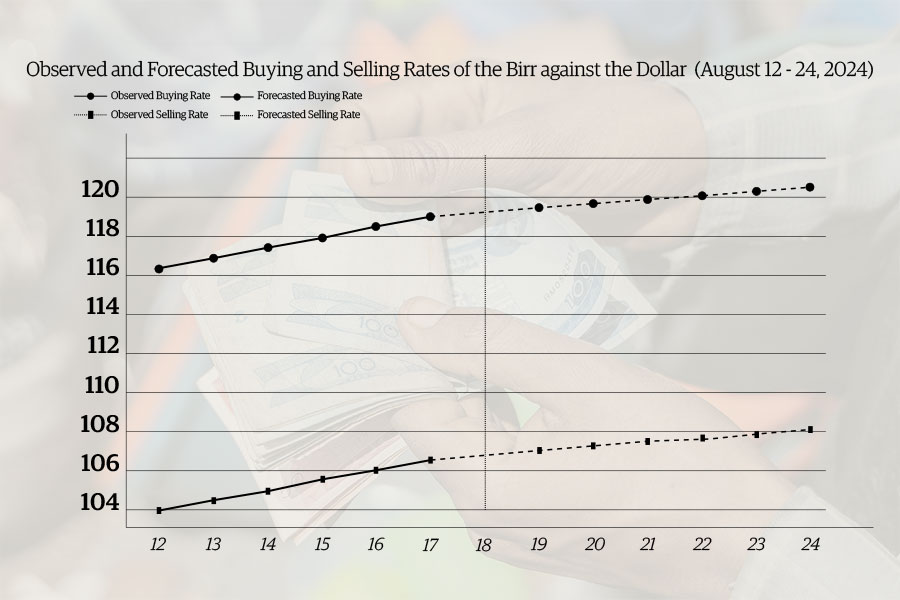
Commentaries | Sep 02,2023
Oct 12 , 2024
The immediate aftereffects of the forex policy shift included heightened exchange rate volatility and restrictions on inflationary pressures, forcing the banking industry to examine its traditional risk and liquidity management approaches. Market interventions could be initiated during periods of extreme volatility to prevent chaos, temporarily stabilising the Birr without backsliding to a managed float, argues this author, whose identity who withheld upon request.
The federal government’s recent move from a fixed to a floating exchange rate system should be seen as more than a routine policy change. It rather represents a seismic transformation with profound implications for the country’s economic stability and competitiveness.
For decades, Birr was pegged to the Dollar, offering predictability in foreign exchange transactions. However, this artificial stability often masked deep economic imbalances and restricted the National Bank of Ethiopia's (NBE) ability to respond to external shocks.
Adopting a floating exchange rate, where the Birr's value is dictated by market forces, would no doubt enhance economic resilience and attract foreign investment. Yet this transition demands meticulous management, well-coordinated policies, and transparent communication with the public.
The immediate concerns in the immediate aftermath of the policy change heightened exchange rate volatility, putting the lid on inflationary pressures, caused by acute liquidity constraints. For the banking industry, this called for a thorough reassessment of traditional approaches to risk and liquidity management, as well as client engagement.
Effective management during this transition is crucial. While the authorities have moved directly to a floating exchange rate without a managed float phase, the Central Bank can still engage in targeted market interventions during periods of extreme volatility or speculative attacks. Such interventions could temporarily stabilise the currency without reverting to a managed float, preventing disorderly market conditions.
Establishing informal exchange rate guidelines or reference rates can help manage market expectations, reducing excessive fluctuations and giving Central Bank officials the room to act if rates move beyond acceptable limits. Strengthening foreign exchange reserve management is essential; a strategic reserve buffer can be used selectively to smooth out large swings in the exchange rate, helping to maintain market confidence.
The Central Bank should enhance its communication strategy by providing clear and consistent guidance on its monetary policy position and its approach to managing exchange rate volatility. Transparent communication can help anchor market expectations and reduce uncertainty, making the floating rate system more predictable for businesses and investors.
Developing financial market infrastructure should be another priority.
Improving the efficiency and transparency of the foreign exchange market, increasing the availability of hedging instruments, and enhancing overall market liquidity are necessary steps to better absorb shocks. Promoting the use of financial instruments such as currency forwards, swaps, and options can help businesses hedge against exchange rate risk.
Although hedging tools are currently limited, prioritising their introduction would provide essential support for businesses struggling to cope with the new exchange rate regime.
Inflation control remains a critical concern. Central Bank authorities should adopt a clear inflation-targeting framework to address potential inflationary pressures associated with a floating rate. This involves setting explicit inflation targets and adjusting monetary policy tools to keep inflation in a single digit, thereby supporting the overall stability of the exchange rate.
Gradual liberalisation of capital controls should be considered, allowing for phased integration with global financial markets. This approach can help manage capital flows and reduce the risk of sudden outflows that could destabilise the exchange rate.
Establishing a resilient framework for monitoring exchange rate movements and economic indicators could enable the Central Bank to respond swiftly with adaptive policy measures, ensuring that the floating rate system operates smoothly and that emerging risks are promptly addressed.
Strengthening the institutional capacity of the Central Bank and related financial institutions should be no less vital. They should be equipped with the tools, expertise, and technology to manage a floating rate effectively. This includes developing a profound understanding of the foreign exchange market, enhancing regulatory frameworks, and investing in capacity-building initiatives to ensure robust oversight and market operations.
Policy coordination and fiscal discipline are essential to achieving these goals. Monetary and fiscal policymakers should read each other to avoid uncoordinated or conflicting policies that undermine the benefits of a floating rate. Prudent fiscal management, including disciplined public spending and responsible budgeting, is necessary to complement the Central Bank's monetary policy objectives.
If shaped by narratives contrary to the policy objectives, public perception could spoil the transition—a fear of the unknown leads to panic and wild market speculations. Engaging the public through transparent communication, and explaining not only the benefits but also the potential risks is crucial. Building trust among the public and stakeholders is essential for a smooth transition.
Ethiopia is not insulated from global economic realities. More importantly, a floating exchange rate regime exposes the Birr to external shocks such as commodity price swings and international financial market volatility. Developing strategies to respond to these risks, including building foreign exchange reserves and exploring hedging options, even if limited, can protect against adverse development.
However, a competitive exchange rate alone will not suffice if the broader environment does not support investment and economic activity. Nurturing a supportive investment environment extends beyond exchange rate policy. Policymakers should focus on improving the overall business climate, including taming bureaucratic obstacles, ensuring legal protections for investors, and improving public infrastructure.
Maintaining peace and stability is a prerequisite. Attracting foreign direct investment and boosting export potential requires not only policy reforms but also a stable and peaceful environment. Political stability, the rule of law, and effective governance are fundamental to creating a conducive climate for investment and trade.
PUBLISHED ON
Oct 12,2024 [ VOL
25 , NO
1276]

Commentaries | Sep 02,2023

Radar | Jul 27,2019

Life Matters | Oct 02,2021

Fortune News | Oct 13, 2024

Radar | Jan 21,2023

Money Market Watch | Aug 18,2024

My Opinion | Sep 11,2020

Commentaries | Mar 02,2019

Radar | Apr 27,2025

Commentaries | Aug 03,2024

Photo Gallery | 178201 Views | May 06,2019

Photo Gallery | 168408 Views | Apr 26,2019

Photo Gallery | 159181 Views | Oct 06,2021

My Opinion | 137055 Views | Aug 14,2021
Commentaries | Oct 25,2025

Dec 22 , 2024 . By TIZITA SHEWAFERAW
Charged with transforming colossal state-owned enterprises into modern and competitiv...

Aug 18 , 2024 . By AKSAH ITALO
Although predictable Yonas Zerihun's job in the ride-hailing service is not immune to...

Jul 28 , 2024 . By TIZITA SHEWAFERAW
Unhabitual, perhaps too many, Samuel Gebreyohannes, 38, used to occasionally enjoy a couple of beers at breakfast. However, he recently swit...

Jul 13 , 2024 . By AKSAH ITALO
Investors who rely on tractors, trucks, and field vehicles for commuting, transporting commodities, and f...

Oct 25 , 2025
The regulatory machinery is on overdrive. In only two years, no fewer than 35 new pro...

Oct 18 , 2025
The political establishment, notably the ruling party and its top brass, has become p...

Oct 11 , 2025
Ladislas Farago, a roving Associated Press (AP) correspondent, arrived in Ethiopia in...

Oct 4 , 2025
Eyob Tekalegn (PhD) had been in the Governor's chair for only weeks when, on Septembe...

Oct 25 , 2025 . By YITBAREK GETACHEW
Officials of the Addis Abeba's Education Bureau have embarked on an ambitious experim...

Oct 26 , 2025 . By YITBAREK GETACHEW
The federal government is making a landmark shift in its investment incentive regime...

Oct 29 , 2025 . By NAHOM AYELE
The National Bank of Ethiopia (NBE) is preparing to issue a directive that will funda...

Oct 26 , 2025 . By SURAFEL MULUGETA
A community of booksellers shadowing the Ethiopian National Theatre has been jolted b...